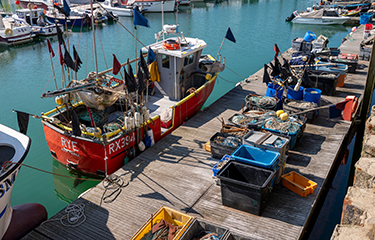U.K. Prime Minister Boris Johnson promised seafood businesses GBP 23 million (USD 31.5 million, EUR 26 million) in emergency aid this week in an effort to mitigate some of the strain caused by border delays resulting from the new customs and export certification requirements of the Brexit trade agreement.
The offering has received mixed reception, with questions being raised over whether its sufficient enough to support the industry through this difficult period.
Following Johnson’s funding pledge, a subsequent statement released by the U.K. government’s Department for Environment Food & Rural Affairs (Defra) explained that the new financial support is in recognition of the “unique circumstances of the fishing sector,” which has faced the most significant new requirements under the trade agreement. Even a short delay can lead to goods perishing for the country’s fishing industry, Defra noted – at a time when it faces lower market prices and demand due to the pandemic.
The fund is targeted at fishing export businesses who can supply evidence of genuine loss in exporting fish and shellfish to the E.U., Defra said. Support will be available immediately and paid retrospectively to cover losses incurred since 1 January, 2021.
The scheme will be targeted at small- and medium-sized enterprises, and the maximum claim available to individual operators will be GBP 100,000 (USD 136,924, EUR 112,967). The Marine Management Organisation (MMO) will administer the scheme on behalf of exporters across the U.K., with more details being made available on eligibility criteria in the coming days, Defra said.
“This GBP 23 million scheme will provide crucial support for fishermen and seafood exporters, who have experienced delays and a lack of demand for fish from the restaurant industry in the U.K. and Europe,” Environment Secretary George Eustice said.“We are continuing to work closely with the fishing and aquaculture sectors to make sure that they are supported, and can continue to fish whilst contributing to the economies of our coastal communities.”
Seafood Scotland Chief Executive Donna Fordyce called the announcement “a step in the right direction.” After almost three weeks of the industry voicing its concerns and frustrations, the trade body said it welcomed the fact that the Scottish seafood sector had been heard and responded to with action.
However, Fordyce said that during the wait for full details of the package to be made public, there will be questions around the extent to which it supports the entire supply chain – from fleet to export.
“As we currently understand it, the deal offers crucial short-term assistance and includes much to be welcomed, particularly the GBP 23 million of new funding,” she said. “It is also reassuring to see that the processing sector is set to be included in future support packages. This will offer a ray of light to some small- and medium-sized companies that have experienced crippling losses over the past few weeks. However, larger companies and smaller shellfish boats are still vulnerable, and will be hoping that they can access support too.”
For fuller repair to occur, Fordyce said, the sector needs to be afforded time and grace.
“Money will offer a much-needed sticking plaster covering the losses over the last few weeks, but to completely staunch the wound, the sector still needs a period of grace during which the systems must be overhauled so they are fit for purpose,” she said.
Scottish Rural Economy Secretary Fergus Ewing said the Scottish government was pleased to see the U.K. government had recognized the calls for compensation, but that it also feared the support may not go far enough. This may be “too little, too late for some businesses that have been left to rot” as a result of the extensive bureaucracy forced on them by a poor Brexit deal and failing U.K. IT systems, he said.
"Whilst we desperately need more detail, it does appear almost certain that the vast majority of fishing vessels who land but don’t export directly will not be covered by this scheme, which is beyond any rational explanation. The U.K. government must step up for all affected businesses. They simply cannot deny the impact that non-tariff barriers are having following the U.K. government’s decision to leave both the single market and customs union of, by far, our largest market,” Ewing said. “They must ensure that their compensation package is open to all whose business has been interrupted or harmed by any aspect of the new export requirements – any attempt to apply conditions or boundaries will render the scheme meaningless and pointless.”
The issues at play, according to Ewing, are grander than initially stated.
“It must be said that as desperately needed as this compensation is for affected businesses, this is merely a sticking plaster for much wider issues and not ‘teething problems’ as has previously been claimed. I again reiterate my call for the U.K. government to immediately rectify their IT problems and seek a grace period with the E.U.,” Ewing said.
Ewing added that it was “unacceptable” that the U.K. government did not consult with the Scottish government on the funding package, as the devolved governments “are clearly best-placed” to take decisions and administer spending in their areas.
“We proved this with our schemes to provide support for all businesses affected by the pandemic – to exclude us from this scheme will delay speed of its delivery and further jeopardize Scottish seafood businesses,” he said.
Since 1 January, U.K. seafood exports to the E.U. require specific procedures, customs declarations, Catch Certificates and Export Health Certificates (EHCs).
Photo courtesy of AVM Images







